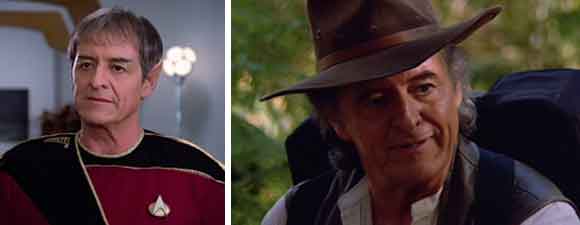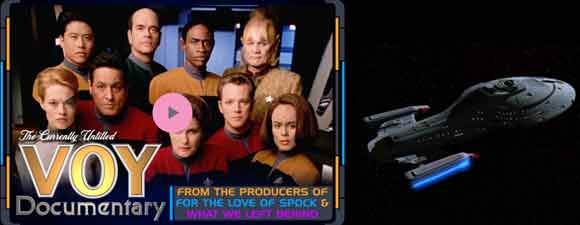Retro Review: Ex Post Facto
5 min readParis is convicted of murder and sentenced to relive the dead man’s final moments every few hours for the rest of his life.
Plot Summary: Tom Paris has been convicted of murder and sentenced to relive the dying memories of his victim every few hours for the rest of his life. Though Paris claims innocence, an alien memory implant is distorting his recollections while damaging his brain. Janeway and Tuvok learn from Kim that Paris was accused of killing Banean scientist Tolen Ren after seducing Ren’s wife. Paris denies any improper contact with Lidell Ren, though he was friendly with her while Kim and her husband worked on Voyager’s equipment. The Baneans are at war with the Numiri, whose military warns Janeway not to meddle when Voyager returns to Ren’s planet to clear Paris’s name. Because Paris becomes incoherent while reliving the implanted memories, Tuvok suggests a mind-meld so that he can witness the alleged crime. The Numiri attack Voyager while Paris is aboard, but the meld gives Tuvok clues to both the murder and the unprovoked attack. After Janeway alerts the Baneans that Paris will be returned by shuttle, the Numiri try to kidnap him, but Janeway has him beamed away and recovers the shuttle by warning the Numiri that it has been packed with explosives. She and Tuvok then visit Banea with Paris, where Tuvok explains that the meld showed him a man considerably shorter than Paris stabbing Ren in a vital Banean organ whose location Paris wouldn’t have known. Tuvok surmises that the symbols superimposed over the end of the recording are codes intended to deliver Ren’s weapons research to the Numiri, which is why they were so anxious to capture Paris. Tuvok clinches his case by showing that Ren’s wary dog is affectionate to the doctor who implanted the memory engrams in Paris, at which point Lidell apologizes, saying Paris wasn’t supposed to get hurt. The Baneans take the traitorous doctor into custody and free Paris, who thanks Tuvok.
Analysis: “Ex Post Facto” is a pretty unexciting crime procedural that could easily have been done on The Next Generation with Riker as the accused and Data defending him or on Deep Space Nine with Nog and Odo. A few minor details would have to be changed, like the investigator using old fashioned questioning techniques to come up with answers instead of a mind meld, but that’s about it. Indeed, except for the feathery headpieces of the Baneans and the fact that the action scenes take place in space, this episode could serve as a forgettable installment of just about any show – indeed, I had forgotten all about it, since I haven’t rewatched it once in two decades, but I remembered instantly what happened, not so much because I recalled the details as because it’s scripted entirely to formula. The writing staff seems to have been going for film noir with a twist, something signaled in the early moments when we see Paris’s altered memories in black-and-white, but because the characters and story elements fit every expectation and cliche of that genre, the additions of a mind meld and a space chase don’t contribute nearly enough to make “Ex Post Facto” a keeper. Indeed, the only truly inspiring moments are throwaway bits involving characters not directly involved with the plot, such as Chakotay outwitting the Numiri with a Maquis trick and Kes and the Doctor demonstrating their growing rapport in matters both medical and personal.
Detective stories are only really fun when the audience has some hope of solving them along with the investigator, or at least gets enough information to see that the detective had to be really brilliant to put all the clues together. In this case, though, the audience can’t know what Tuvok thinks he’s seeing in the meld – like Paris, we have no reason to believe the symbols in the memories are a secret code rather than a Banean copyright mark, and we see Lidell and Tom standing next to each other so briefly that it’s hard to realize there’s supposed to be a height discrepancy. And when Tuvok calls the dog as a witness, it becomes very hard to take the story seriously. Film noir gets most of its impact from its tone, which is generally as dark as atmospheric as the stories of crime and murder most often told in moody style in the genre. While it would be nice to see a version with a real twist, like the femme fatale not actually being a stereotypical bad girl, that might be more forgivable if there were real intrigue behind her motive – in this case, if we knew more about the Banean-Numiri war, if it turned out Lidell thought she was saving her planet instead of indulging her greed and sexual boredom, if Ren turned out not to be the kindly scientist he seemed but a really dangerous man. Instead we get a comically absurd element breaking up the mood, which doesn’t improve the story but makes the writers look really desperate for some kind of conclusion.
Janeway comes across pretty strongly despite the weak plot, though it’s surprising she’d let a chief security officer who’s such a good friend risk a dangerous mind meld without suggesting that he first try more traditional techniques like asking Paris more detailed questions. I really hate when mind melds get used as gimmicks rather than the deeply personal touching of thoughts we witnessed between Spock and crewmembers mostly in dire emergencies. And it would be nice if Janeway read Paris the riot act about intimate conversations with alien women – in a lot of Earth cultures, even casual flirtations can get people into serious trouble. Paris is quite likable when he’s thinking with his brain instead of his libido, but between his holographic girlfriends and this, it’s hard to take him seriously as Starfleet material. Then again, my very favorite scene in the episode is the one in which Chakotay outwits the Numiri patrol while bantering with Janeway about battle tactics, in which she tells him he’s using a very old trick and they chuckle about how he wouldn’t have gotten away with it on a Maquis ship if she’d been chasing him. We’re supposed to believe that the Maquis cause is near and dear to Chakotay’s heart, so the fact that he’ll joke about it with this captain on the bridge comes across as flirting, just like the animal guide conversation on the bridge came across as flirting, and once again Janeway gets her hands all over his shoulder to congratulate him on a job well done. I thought rewatching Voyager would open my eyes to how deluded I’d been to thinking there had been something between Janeway and Chakotay, but instead it feels like I was right all along.







Well, to be fair, Paris really isn’t Starfleet material. He starts out the show in jail, after all.
An entertaining episode. My rating: 7/10.
“And it would be nice if Janeway read Paris the riot act about intimate
conversations with alien women – in a lot of Earth cultures, even casual
flirtations can get people into serious trouble.”
I’d love to see the nuclear explosion that would happen if any poor bastard ever tried to flirt with Michelle.